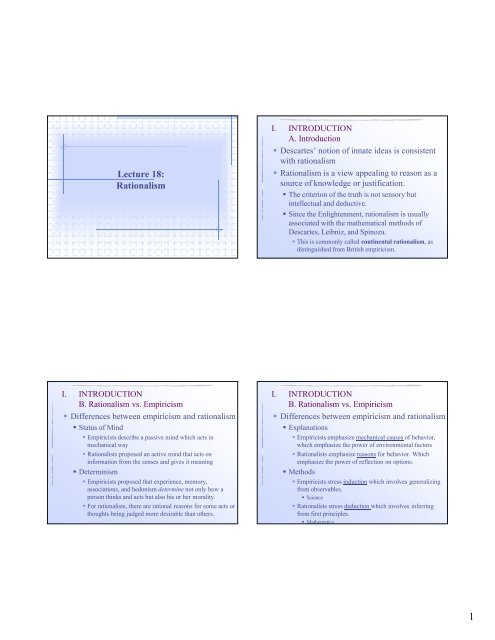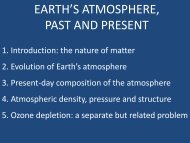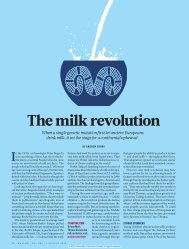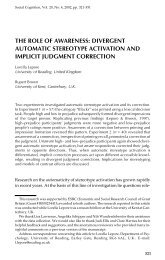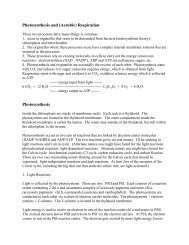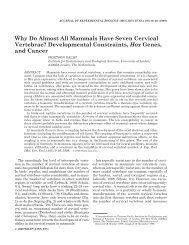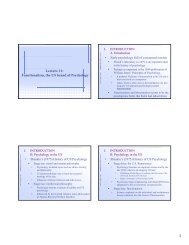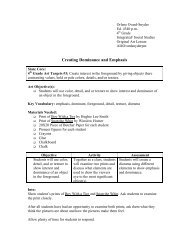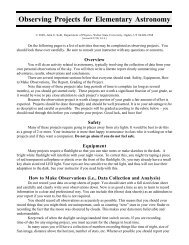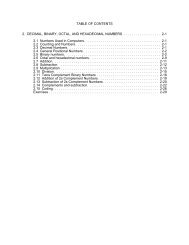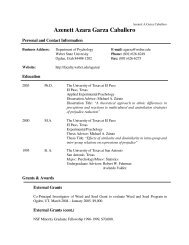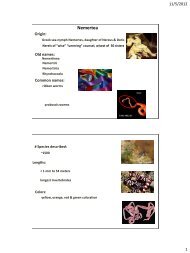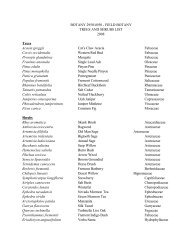Lecture 18: Rationalism - Weber State University
Lecture 18: Rationalism - Weber State University
Lecture 18: Rationalism - Weber State University
Create successful ePaper yourself
Turn your PDF publications into a flip-book with our unique Google optimized e-Paper software.
<strong>Lecture</strong> <strong>18</strong>:<br />
<strong>Rationalism</strong><br />
I. INTRODUCTION<br />
A. Introduction<br />
Descartes’ notion of innate ideas is consistent<br />
with rationalism<br />
<strong>Rationalism</strong> is a view appealing to reason as a<br />
source of knowledge or justification.<br />
The criterion of the truth is not sensory but<br />
intellectual and deductive.<br />
Since the Enlightenment, rationalism is usually<br />
associated with the mathematical methods of<br />
Descartes, Leibniz, and Spinoza.<br />
This is commonly called continental rationalism, as<br />
distinguished from British empiricism.<br />
I. INTRODUCTION<br />
B. <strong>Rationalism</strong> vs. Empiricism<br />
Differences between empiricism and rationalism<br />
Status of Mind<br />
Empiricists describe a passive mind which acts in<br />
mechanical way<br />
Rationalists proposed an active mind that acts on<br />
information from the senses and gives it meaning<br />
Determinism<br />
Empiricists proposed that experience, memory,<br />
associations, and hedonism determine not only how a<br />
person thinks and acts but also his or her morality.<br />
For rationalists, there are rational reasons for some acts or<br />
thoughts being judged more desirable than others.<br />
I. INTRODUCTION<br />
B. <strong>Rationalism</strong> vs. Empiricism<br />
Differences between empiricism and rationalism<br />
Explanations<br />
Empiricists emphasize mechanical causes of behavior,<br />
which emphasize the power of environmental factors<br />
Rationalists emphasize reasons for behavior. Which<br />
emphasize the power of reflection on options.<br />
Methods<br />
Empiricists stress induction which involves generalizing<br />
from observables.<br />
Science<br />
Rationalists stress deduction which involves inferring<br />
from first principles.<br />
Mathematics<br />
1
II. THE CONTINENTAL RATIONALISTS<br />
A. Baruch Spinoza<br />
Baruch Spinoza 1632 – 1677)<br />
Dutch philosopher of Portuguese<br />
Jewish origin.<br />
Considered one of greatest rationalists<br />
Contrary to Descartes, he proposed<br />
that God, nature, and mind were<br />
aspects of the same substance<br />
God, nature, and mind were<br />
inseparable<br />
Pantheism: God was nature<br />
To understand nature is to understand God<br />
as God is present everywhere and in<br />
everything.<br />
II. THE CONTINENTAL RATIONALISTS<br />
A. Baruch Spinoza<br />
Contrary to Dualism, Spinoza<br />
proposed Double Aspectism<br />
Mind and body were two aspects of<br />
the same thing.<br />
We really do not have free will.<br />
<br />
<br />
Nature (God) is lawful and humans are<br />
part of nature<br />
Thus thoughts and behavior are<br />
lawful – determined.<br />
Our “freedom” is realizing that everything<br />
that is must necessarily be and everything<br />
that happens must necessarily happen -<br />
because everything results from God.<br />
II. THE CONTINENTAL RATIONALISTS<br />
A. Baruch Spinoza<br />
Pleasure comes from entertaining<br />
clear ideas, which are conducive<br />
to the mind’s survival<br />
When the mind entertains unclear<br />
ideas, it feels weak and vulnerable.<br />
Passion is a general upheaval not<br />
associated with a particular<br />
thought.<br />
Emotion is linked to a particular<br />
thought.<br />
II. THE CONTINENTAL RATIONALISTS<br />
B. Nicolas de Malebranche<br />
Nicolas de Malebranche (1638 –<br />
1715)<br />
French rationalist philosopher.<br />
He sought to demonstrate the active<br />
role of God in every aspect of the<br />
world.<br />
Proposed mind-body<br />
Occasionalism<br />
<br />
When a person has a desire to<br />
move a part of the body, God is<br />
aware of this and moves the body<br />
part.<br />
2
II. THE CONTINENTAL RATIONALISTS<br />
C. Gottfried Wilhelm von Leibniz<br />
Gottfried Wilhelm von Leibniz<br />
(1646 - 1716)<br />
German philosopher invented<br />
calculus independently of Newton<br />
Also invented the binary system.<br />
Disagreed with Locke, believing<br />
ideas don’t come from experience<br />
Ideas are immaterial and cannot be<br />
caused by material activity such as<br />
sense activity.<br />
Ideas must be innate – which means<br />
the potential for an idea s innate.<br />
II. THE CONTINENTAL RATIONALISTS<br />
C. Gottfried Wilhelm von Leibniz<br />
Monads<br />
The universe consisted of an<br />
infinite number of life units called<br />
monads.<br />
A monad is like a living atom; all<br />
monads are active and conscious.<br />
Monads differ in clarity of<br />
consciousness in a hierarchy<br />
In general the hierarchy goes from<br />
God, the highest, to humans, then to<br />
animals, followed by animals,<br />
plants, and nonliving matter.<br />
II. THE CONTINENTAL RATIONALISTS<br />
C. Gottfried Wilhelm von Leibniz<br />
Mind-body issue<br />
Leibniz proposed a psychophysical<br />
parallelism with a preestablished<br />
harmony.<br />
Argued that monads never influence<br />
each other; it only appears that they<br />
do.<br />
The mind and body appear to<br />
influence each other, but they do<br />
not work in parallel.<br />
They work in harmony because<br />
God planned it that way.<br />
II. THE CONTINENTAL RATIONALISTS<br />
C. Gottfried Wilhelm von Leibniz<br />
Perceptions<br />
Perceptions can be conscious or<br />
below consciousness (petites<br />
perceptions)<br />
As petites perceptions accumulate,<br />
their force causes apperception.<br />
Law of Continuity<br />
All differences in nature are<br />
characterized by small gradations.<br />
<br />
Limen<br />
Threshold<br />
3
II. THE CONTINENTAL RATIONALISTS<br />
E. Thomas Reid<br />
Thomas Reid (1710 –1796)<br />
Scottish philosopher and founder<br />
of the Scottish School of Common<br />
Sense<br />
Reid claimed that our common sense<br />
(sensus communis) justify our belief<br />
in an external world.<br />
Because all humans are convinced of the<br />
existence of physical reality, it must<br />
exist.<br />
Direct Realism<br />
<br />
Sensations are an accurate reflection<br />
of reality immediately, not after the<br />
mind has operated on them.<br />
II. THE CONTINENTAL RATIONALISTS<br />
F. Thomas Reid<br />
Reasoning powers of the mind<br />
include several faculties.<br />
More than a classification, as done<br />
by other faculty psychologists (c.f.,<br />
human mind consists of separate or<br />
trainable powers or faculties).<br />
Mental faculties are active<br />
powers of the mind<br />
They actually existed and<br />
influenced people’s thoughts and<br />
behavior.<br />
II. THE CONTINENTAL RATIONALISTS<br />
G. Immanuel Kant<br />
Immanuel Kant (1724 – <strong>18</strong>04).<br />
Proposed that the mind must add<br />
something to sensory data before<br />
knowledge can be attained.<br />
Up to now it has been assumed<br />
that all our cognition must<br />
conform to the objects; but ...let<br />
us once try whether we do not get<br />
farther with the problems of<br />
metaphysics by assuming that the<br />
objects must conform to our<br />
cognition<br />
II. THE CONTINENTAL RATIONALISTS<br />
G. Immanuel Kant<br />
The quality of mind was<br />
provided by a priori (or before<br />
experience) categories of<br />
thought.<br />
10 A priori categories of<br />
thought:<br />
Unity, totality, time, space, cause<br />
and effect, reality, quantity,<br />
quality, negation, possibilityimpossibility,<br />
and existencenonexistence.<br />
4
II. THE CONTINENTAL RATIONALISTS<br />
G. Immanuel Kant<br />
Our mental experience<br />
Always structured by the<br />
categories of thought.<br />
Our “phenomenological<br />
experience” is an interaction of<br />
sensations and the categories of<br />
thought.<br />
Can never know the true physical<br />
reality just appearances<br />
(phenomena) that are controlled<br />
by the categories of thought.<br />
II. THE CONTINENTAL RATIONALISTS<br />
G. Immanuel Kant<br />
Apriori (prior to experience)<br />
The mind adds the concept of time<br />
and space to sensory information.<br />
They are both provided by an a priori<br />
category of thought.<br />
Categorical Imperative<br />
The rational principle which governs<br />
or should govern moral behavior<br />
Similar to older moral precepts such<br />
as the “golden rule”.<br />
Anthropology<br />
A nonscientific way of studying how<br />
people actually behave<br />
II. THE CONTINENTAL RATIONALISTS<br />
H. Johann Friedrich Herbart<br />
Johann Friedrich Herbart (1776 -<br />
<strong>18</strong>41)<br />
German philosopher and<br />
psychologist who began pedagogy<br />
– the study of way of teaching.<br />
Did not believe psychology could<br />
be an experimental science.<br />
The mind acts as an integrated<br />
whole therefore it could not be<br />
fractionated.<br />
II. THE CONTINENTAL RATIONALISTS<br />
H. Johann Friedrich Herbart<br />
Psychic Mechanics<br />
Ideas had a force or energy of their<br />
own and the laws of association<br />
were not necessarily to bind them.<br />
Ideas have the power to attract or<br />
repel other ideas, depending on<br />
their compatibility.<br />
Ideas attempt to gain expression in<br />
consciousness and compete with<br />
each other to do so.<br />
5
II. THE CONTINENTAL RATIONALISTS<br />
H. Johann Friedrich Herbart<br />
Apperceptive Mass<br />
Compatible ideas that are in<br />
consciousness to which we are<br />
attending at given moment.<br />
Ideas outside apperceptive mass<br />
(incompatible ideas) are repressed by<br />
the powers of the ideas in the mass.<br />
Limen<br />
<br />
The threshold between conscious<br />
and unconscious<br />
Goal was to mathematically express<br />
the relationships among the<br />
apperceptive mass, the limen, and the<br />
conflict among ideas.<br />
II.<br />
<br />
THE CONTINENTAL RATIONALISTS<br />
H. Johann Friedrich Herbart<br />
Effective Teaching:<br />
Review material already learned<br />
Prepare students for new<br />
material by giving overview of<br />
upcoming material<br />
Present new material<br />
Relate new material to what has<br />
already been learned<br />
Show applications of new<br />
material<br />
Give an overview of next<br />
material to be learned.<br />
II. THE CONTINENTAL RATIONALISTS<br />
I. Georg Wilhelm Friedrich Hegel<br />
G.W.F. Hegel (1770 –<strong>18</strong>31)<br />
German philosopher, and one of<br />
the creators of German idealism<br />
He developed a concept of<br />
mind or spirit that manifested<br />
itself in a set of contradictions<br />
and oppositions that it<br />
ultimately integrated and<br />
united.<br />
The Absolute<br />
<br />
<br />
Universe is interrelated unity<br />
True knowledge is attained by<br />
relating isolated instances to the<br />
“whole.”<br />
II.<br />
<br />
THE CONTINENTAL RATIONALISTS<br />
I. Georg Wilhelm Friedrich Hegel<br />
Our understanding progresses<br />
toward the absolute by the<br />
dialectic process,<br />
First have a thesis (a point of<br />
view) and an antithesis<br />
(opposite point of view),<br />
Then have a synthesis (a<br />
compromise between the thesis<br />
and the antithesis), which is a<br />
new point of view.<br />
This new point of view now<br />
becomes the thesis for the next<br />
dialectic process.<br />
6
II. THE CONTINENTAL RATIONALISTS<br />
I. Georg Wilhelm Friedrich Hegel<br />
Hegel proposed the concept of<br />
alienation (self-estrangement)<br />
Later used in theories of Eric<br />
Fromm, Carl Rogers, and the<br />
existentialists.<br />
7


